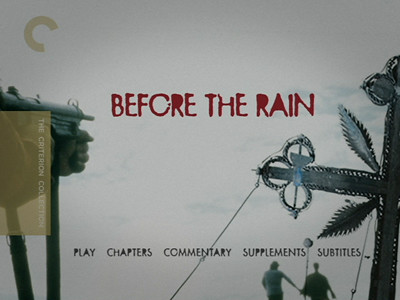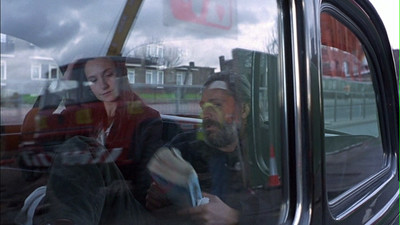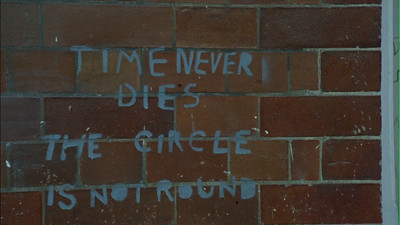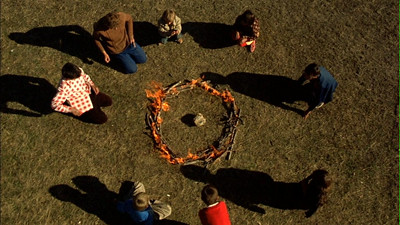By David Edenden
This is the best detailed review I have read of "Before the Rain" which was recently released in a superior edition by the publisher of classic DVD films - Criterion Confessions
Even if you have seen the movie and have the VHS tape, this is a must have DVD for your library!
BEFORE THE RAIN - #436
Jamie S. Rich
"Time never dies. The circle is not round."
Macedonian director Milcho Manchevski made Before the Rain in 1994, and it was the first film to be shot in his native country after it became an independent republic following much political turmoil. Thus, it is of little surprise that the narrative largely concerns itself with the nature of violence and the schisms between people, particularly the ones that form in our inability to express ourselves. Or perhaps more accurately, the disparities in the methods we choose for expression.
Manchevski, a photographer and music video director most famous for directing Arrested Development's "Tennessee" (included on this DVD), was quite ambitious for his debut feature. Before the Rain is broken into three separate sections that all connect in some way or another. Like a Kieslowski triptych, you won't always see the connections immediately, but as the writer/director pulls his threads together, the image he is creating does tighten up into something that is, for the most part, profound.
Story #1 is "Words,"
Story #1 is "Words," and it involves a scared Albanian girl, Zamira (Labina Mitevska), who hides out in the room of a Macedonian priest, Kiril (Gregoire Colin). The young clergy has taken a vow of silence, so even when her hunters come searching for the girl, whom they have accused of murdering one of their family, he refuses to admit she is there, neither through words or any other means. This includes lying to his head priest, who expels the two of them from the church once the lie is exposed, making the girl Kiril's responsibility. He can speak now, but they still can't communicate verbally, as she only speaks Albanian and he only speaks Macedonian.
In this simple set-up, Manchevski quickly introduces the conflict that is threatening to tear Macedonia apart. The separate languages is the first line, and the second is religion. The Albanian minority is largely Muslim, while the other Macedonians in the area are Christian. In this sense, Zamira and Kiril are the most unlikely of allies, praying to different versions of God that many would say are mutually exclusive. Though Manchevski is admirably sympathetic to his religious characters, avoiding portraying them as cartoons, I don’t think the director is that sympathetic to them overall. Note how quickly Kiril embraces the idea of a new life, planning to take the girl and journey all the way to London, where he has an uncle that will help them.
Story #2 is "Faces,"
London is the setting of Story #2, "Faces," and the movie takes a hard shift from the rural environs of Macedonia to the urban sprawl of Britain. Anne (Katrin Cartlidge, Naked) is a troubled woman working for a news agency. The vast scope of their coverage is represented in the pictures she must sort through, where a snapshot of Madonna's breasts is of equal importance to more gruesome shots from European war zones. Anne is estranged from her husband, newly pregnant, and not at all prepared for the unannounced reappearance of Aleksandar (Rade Serbedzija, who is probably familiar to many American viewers from a recent stint on "24"). Aleksandar is a war photographer who has just left his assignment in Bosnia under a dark cloud. He wants to take Anne back with him to his native Macedonia. She refuses, not knowing how to deal with her current state of being, and also fearful of the violence happening on the continent.
Of course, in a movie like Before the Rain, Anne is going to quickly discover that as long as one place in the world suffers from violence, then nowhere is safe. An unexpected attack in the restaurant where she is dining--an old, unexplained feud between two men that erupts into something that effects everyone, a microcosm of the world's problems--alters her life again whether she likes it or not. Before his departure, she had noted how Aleksandar's face had changed, telegraphing a change in him. In the final scenes of this segment, another face communicates a much more horrific transition.
Story #3 is "Pictures,"
Story #3 is "Pictures," and it is the longest of the movie. It involves Aleksandar's return to his hometown, where he discovers that everything is too tellingly the same. Old blood feuds are as alive as old romances (Aleksandar pines for his high school sweetheart, who is Albanian), and the changes in the country have only made certain divides grow even wider and less traversable. Aleksandar has come to the same town we saw in "Words," and his relatives are the men who hunted the little girl. Though his intention was to leave the field of battle to find some peace in the familiar, as it turns out, battle is what is familiar.It's probably telling that Manchevski chose "Pictures" as his main story, that the mode of expression that Aleksandar had been using to communicate the horrors of the world to a populace that rarely sees such violence is the one most related to the director's own. He, too, is using pictures to show the moviegoing public what has been happening in Macedonia. Thus, Manchevski must also feel quite deeply what it means for Aleksandar to forsake photography. He takes only one photo in Macedonia, a family portrait that shows how out of step he is with his native people. Just as the auto timer was about to snap the image, Aleksandar swats an insect. In the picture, his family is looking at the camera, stable and frozen in place, while Aleksandar is looking away, restless, trying to stop a nagging problem.

Anne had told Aleksandar that he has to pick a side, something a journalist is never supposed to do. Cozying up to one side in Bosnia is what caused his existential crisis, and he'd rather stay out of it back home, as well, but his former flame (Silvija Stojanovska) also pushes him to take a stand. It's her daughter that the men have been after, and there are intimations that maybe it could be Aleksandar's daughter, just as even though Anne tells her husband that her baby is his, there is no way to know for sure. Anne wanted to tell Aleksandar that she was pregnant, but when she asked him if he wanted to have children, the expression on Aleksandar's face is all she needed for an answer. I think Aleksandar's eventual decision, however, is not a statement that one can't remain neutral forever, but having chosen one side, he must redress the balance by this time choosing the other--though this is a function of his own code, and not necessarily an overall point of Manchevski's.
Milcho Manchevski has a pretty solid grip on what he's trying to do here. As a first-time director, he shows an exceptionally capable eye for visual images, working with director of photography Manuel Teran (District B13) to create a strong sense of place, from the sweeping, almost epic shots of the open fields of Macedonia to the more claustrophobic, gray streets of London. In keeping the metaphor of the constant movement of time, Before the Rain is a movie that feels like it is constantly in motion, only stopping for the most intimate moments, when two people take the time to stop and talk. I like how the story titles move us from one code to another: from words being the most fundamental of our communication tools, language being one thing that makes us distinctly human, to faces, which we universally share, and finally to the still image, which both freezes time and allows it to travel anywhere in the world.

These metaphors are handled much better than the titular imagery. In each story, there are multiple references to an oncoming storm, the climate of the day always being just before the deluge. It's not exactly a new metaphor, and the execution can be heavy handed, particularly in the final shots, when the music swells and a montage makes sure we understand the full connections at last. Manchevski's independent budget also becomes apparent when the story takes its violent turns. I suppose I could accept an argument that the killing of an obviously toy cat and the London shooter's gun with its ridiculously ample ammunition clip are purposely fake in order to comment on how consumers of Western entertainment view violence, but even if that were true, it's a misguided artistic conceit that takes the viewer out of the movie and undermines the gravity of Manchevski's larger issues. Plus, it's an inconsistent technique. While the footage of real calves being born could be put up as juxtaposition, of how in Before the Rain birth is natural and death by gun is not, we'd still have to reconcile other realistic scenes of violence, such as the children burning the turtle in the beginning.
Of all of Manchevski's artistic choices, the one I find most interesting is his treatment of time. "Time never dies. The circle is not round," shows up more than once in the movie. It's spoken by a priest in "Words," and then it's seen as graffiti in "Faces"--the slogan thus following the path of the rest of the movie from active to still. It's a seemingly contradictory statement since the movie is very much a circle, with the ending of the film taking us right back to the beginning.

And yet, this return does comes as a bit of a surprise. That's because there are several story points that are out of joint. Time in Before the Rain is a wavy, inconstant line that only doubles back on itself at random. In "Words," Anne looks at photos of Kiril and Zamira that she receives prior to Aleksandar's departure, though most will wonder later if he actually took them (as events will show us, he clearly could not, at least not by that point in the timeline). After he has left and is on his way to Macedonia, Anne also takes a call for Aleksandar, someone from Macedonia whom we assume is Kiril and that would lead us to believe the photographer is actually the uncle he mentioned in London.
These happenings cannot be reconciled with where Aleksandar eventually ends up in the story, at least not unless we are missing a chunk of time in Anne's life. I don't see this as a flaw, however, it looks to me like this is by design. It's almost as if Before the Rain is a time travel movie, and Aleksandar's going back in time accidentally instigates the events he is trying to stop. Certainly that has happened in a kind of literary sense, as he has tried to return to his childhood home as a way to escape violence and then becomes a part of it.

It's through this seeming anomaly that Before the Rain makes its most compelling argument for the inevitability of human action and the difficulty we have in affecting change. Life goes on and on, despite our best efforts to help or hinder it. In that sense, it is larger than us. Time is beyond our control. The same priest who first says that "Time never dies" amends that assertion in the final montage to "Time doesn't wait." The final shot of Aleksandar, though, and the beatific look on his face, tells us that this is not a warning to get out of its way, but instead an admonition that we best not dawdle too long before jumping in and at last say what we mean, to at last pick a side.

Heading for the tree of life...?



No comments:
Post a Comment